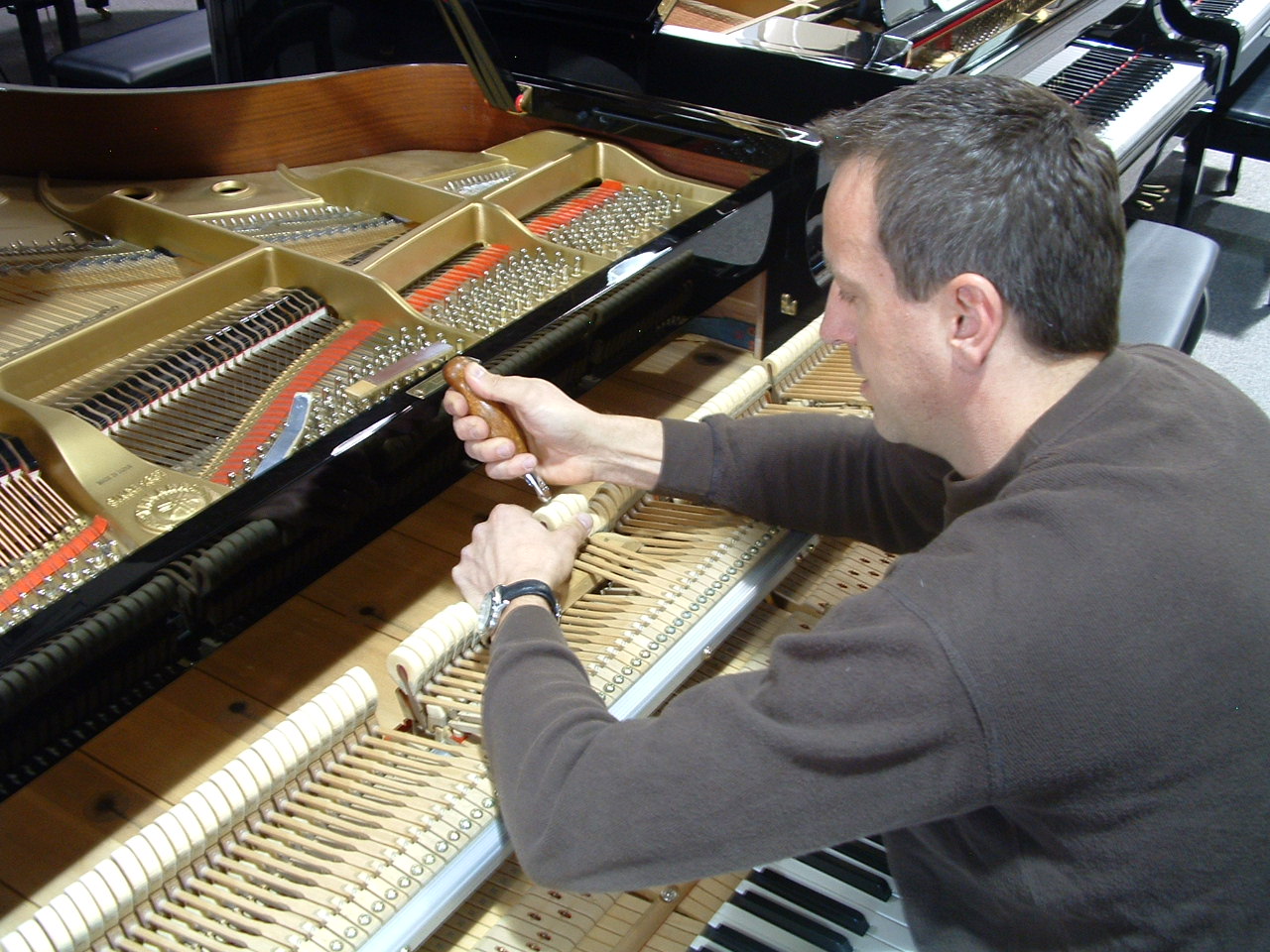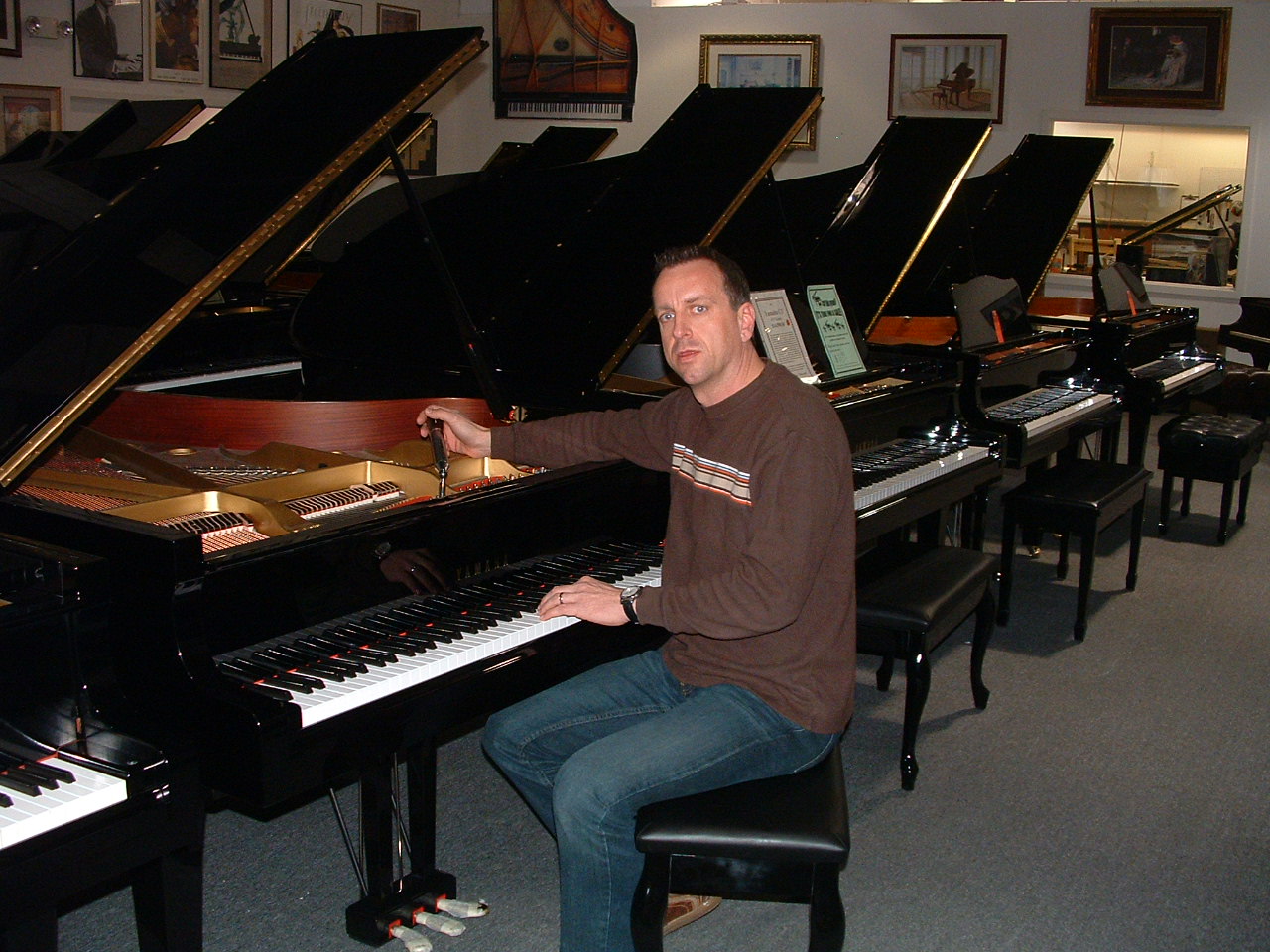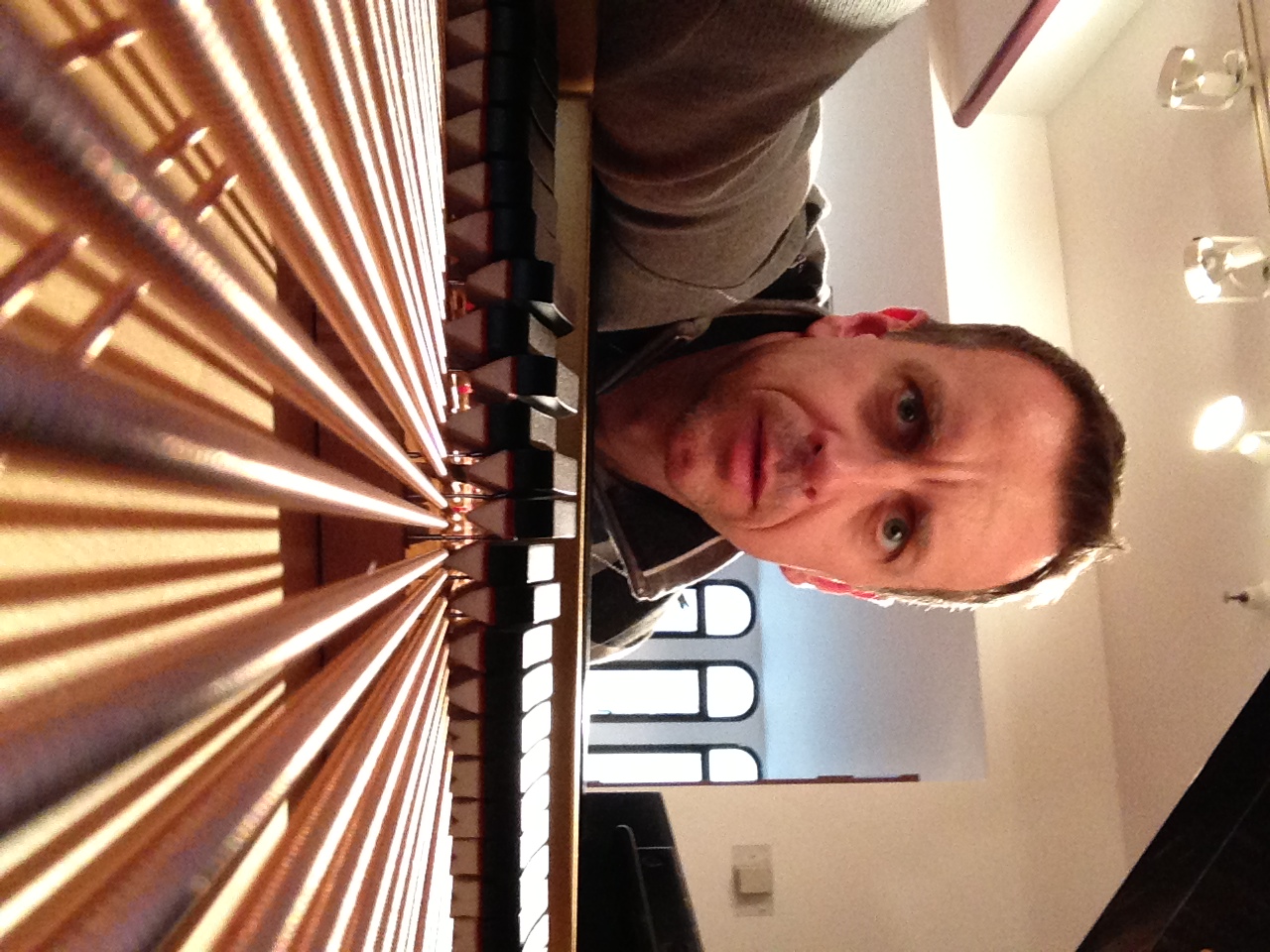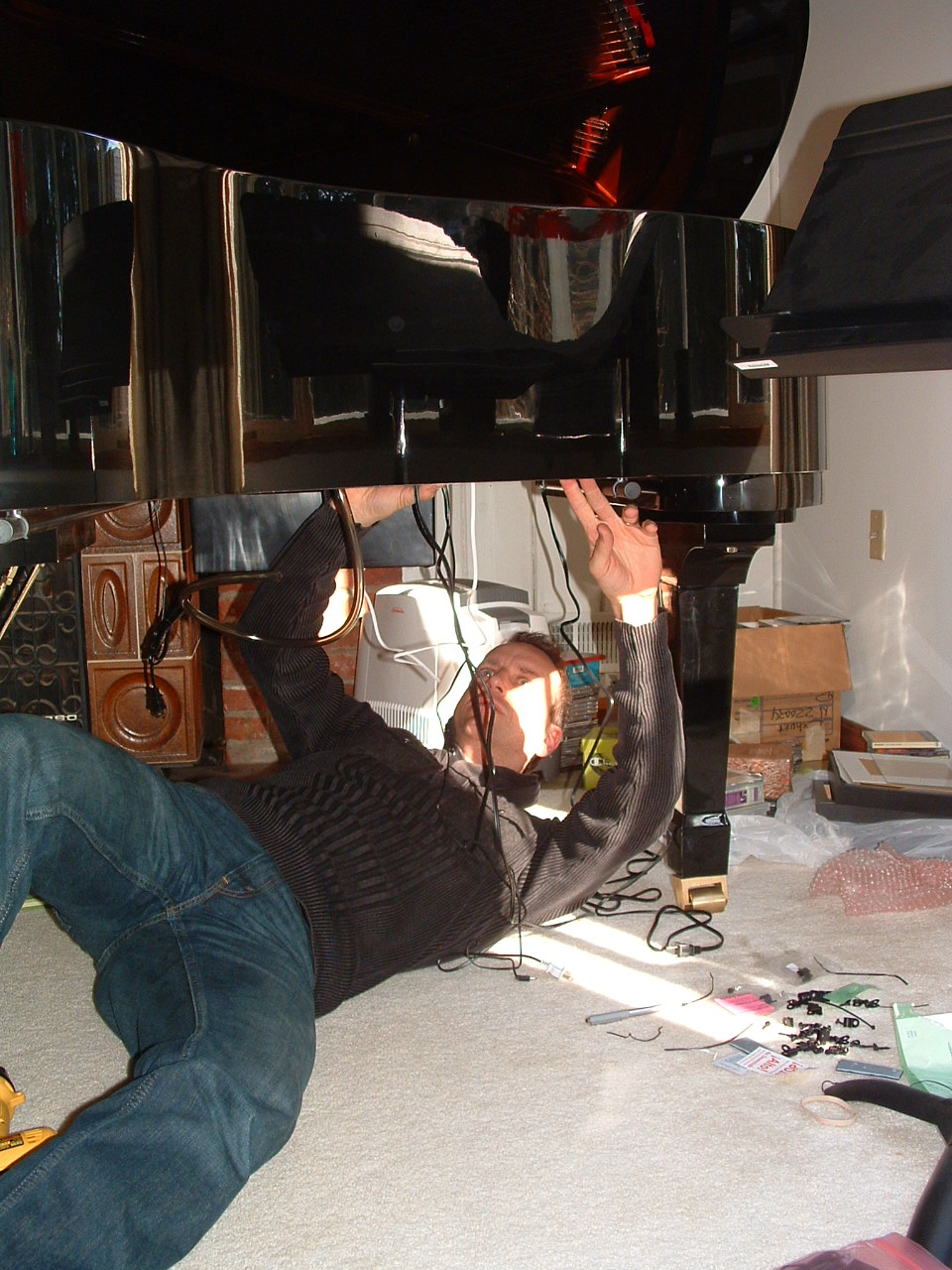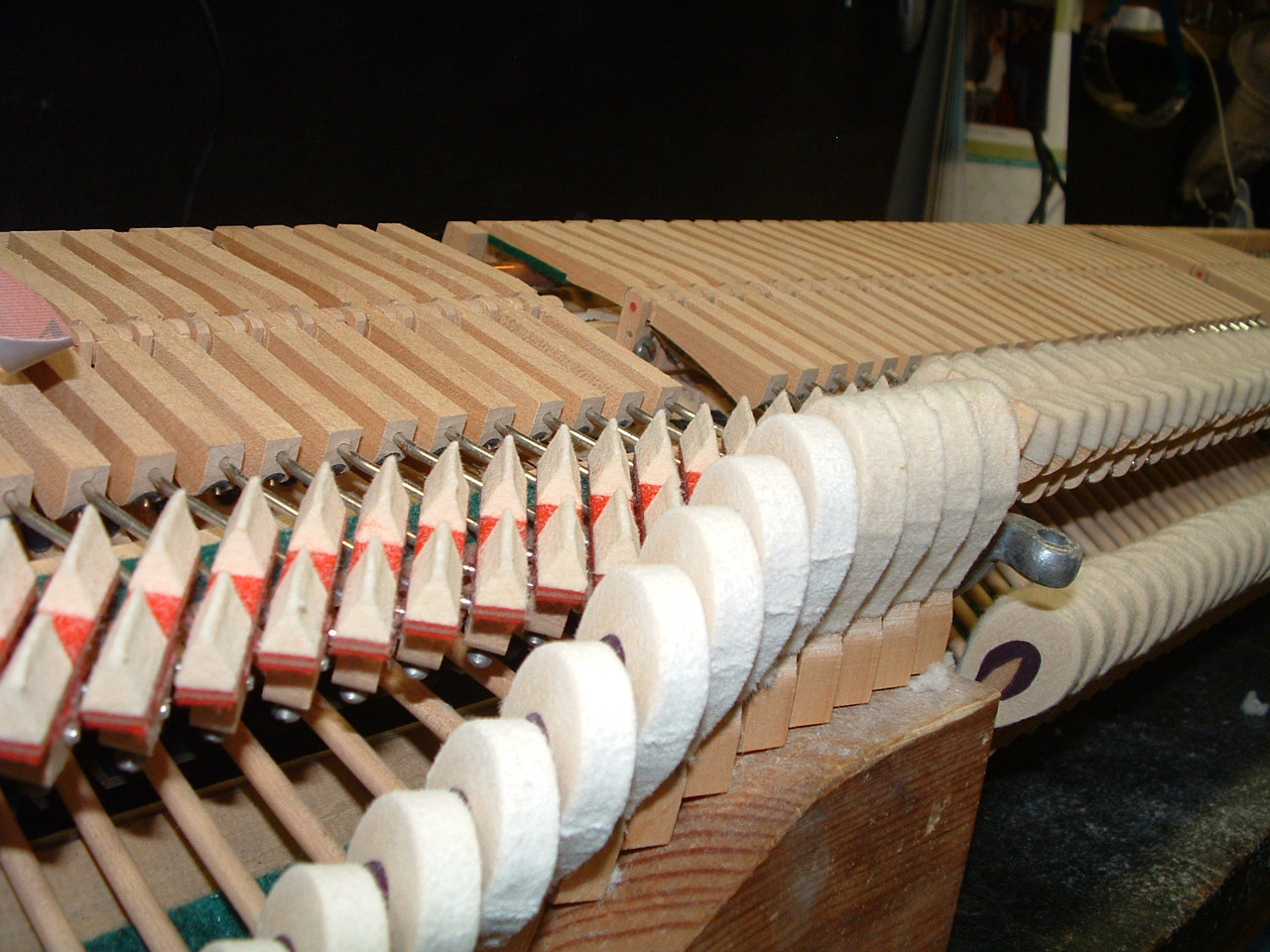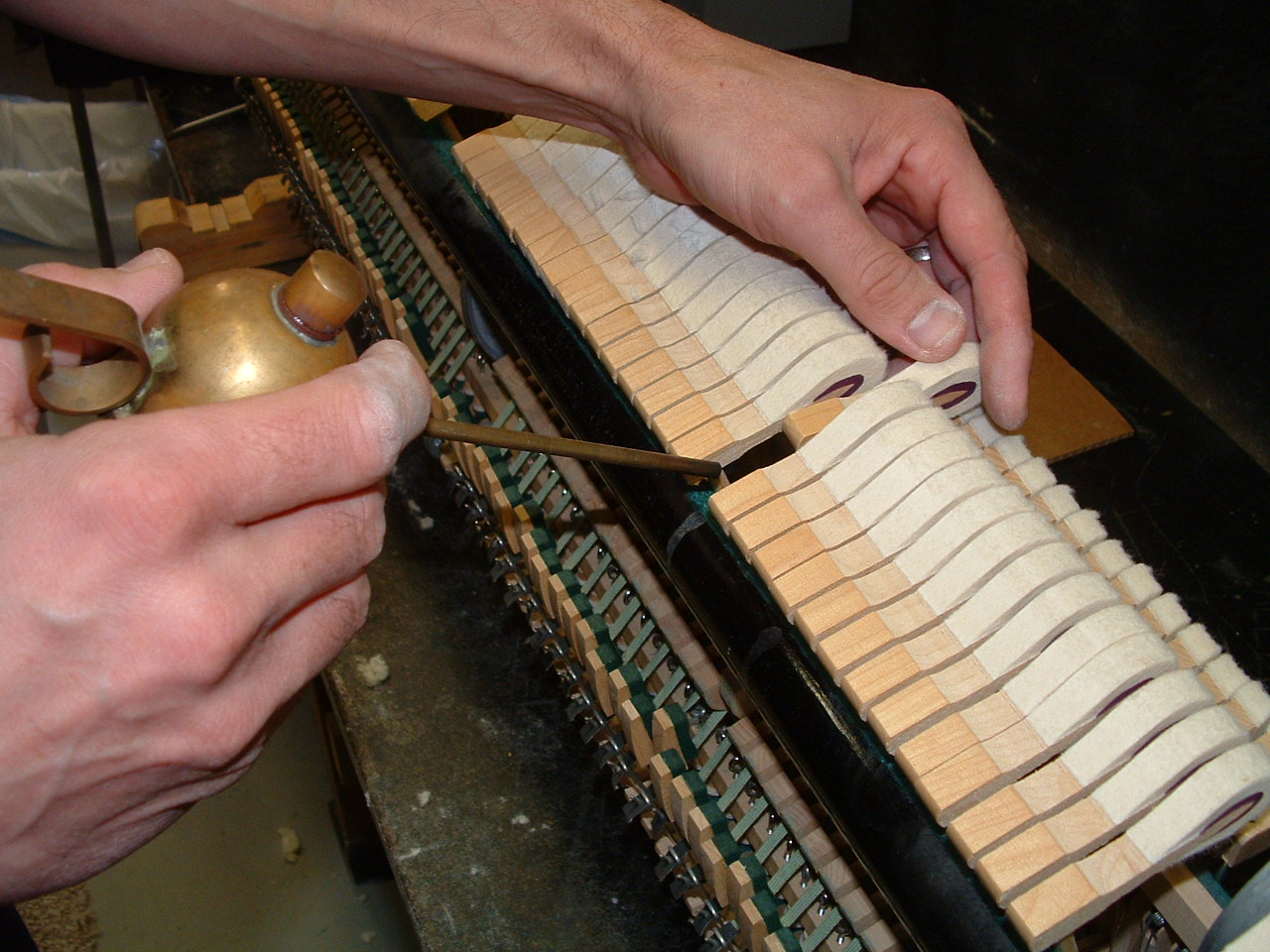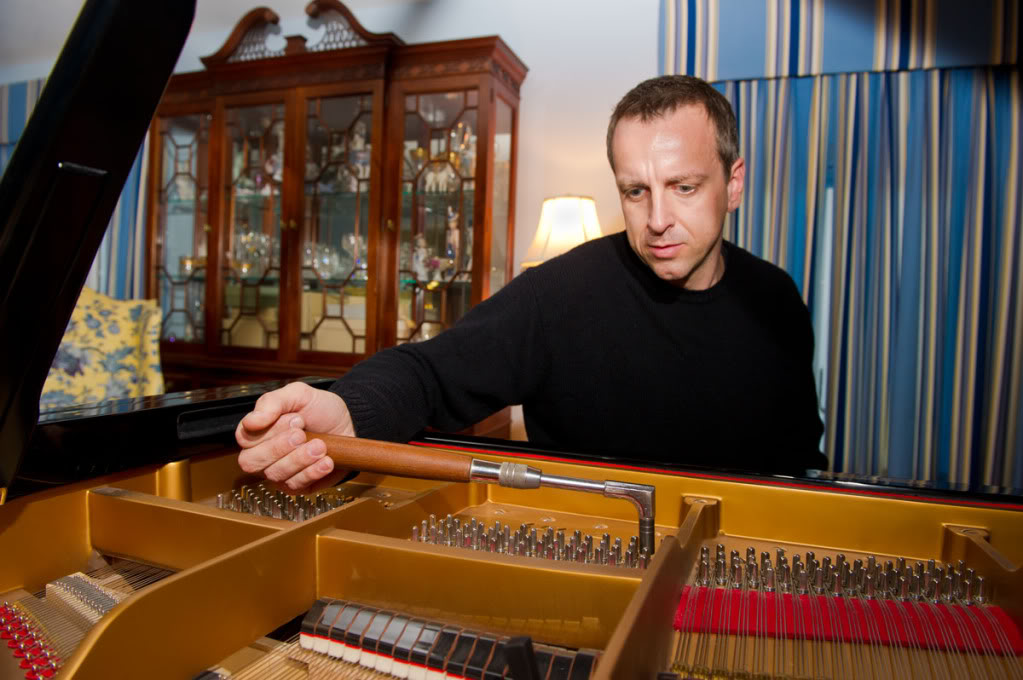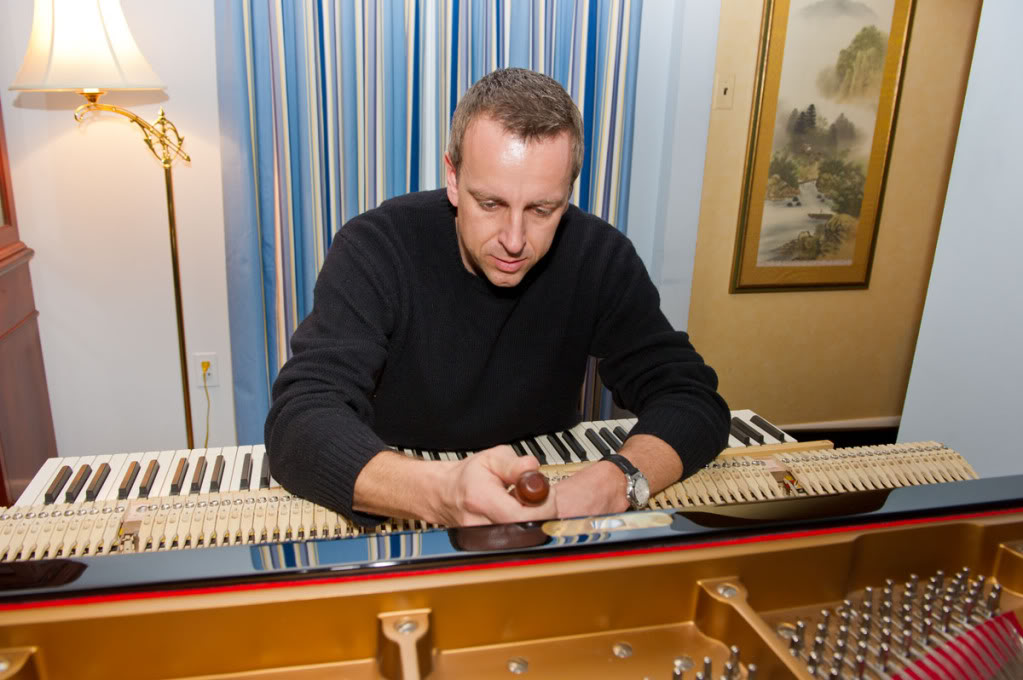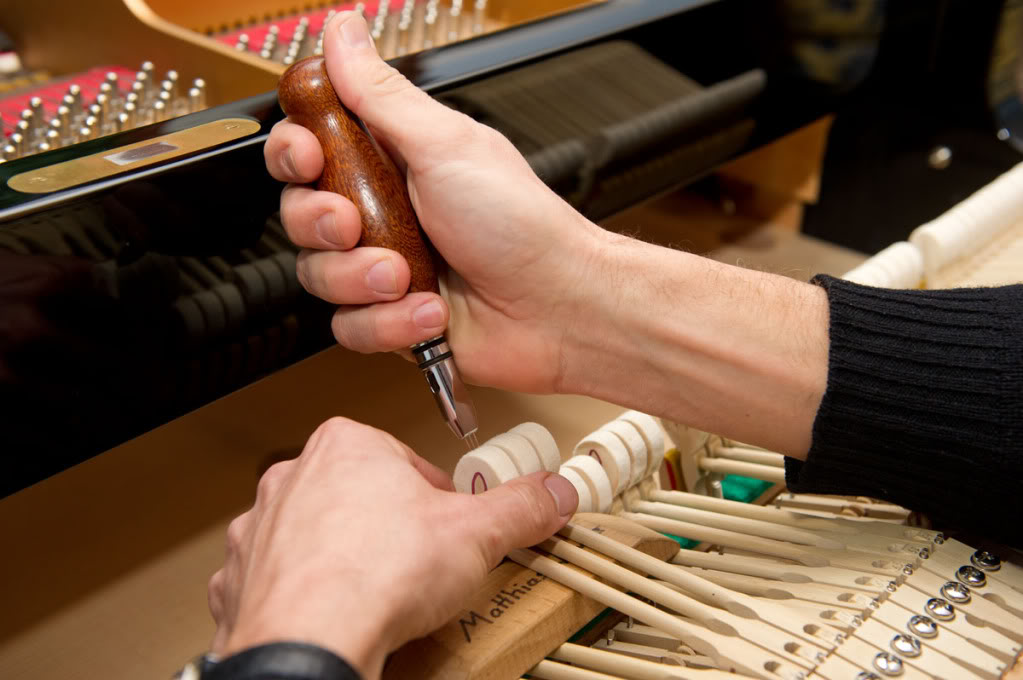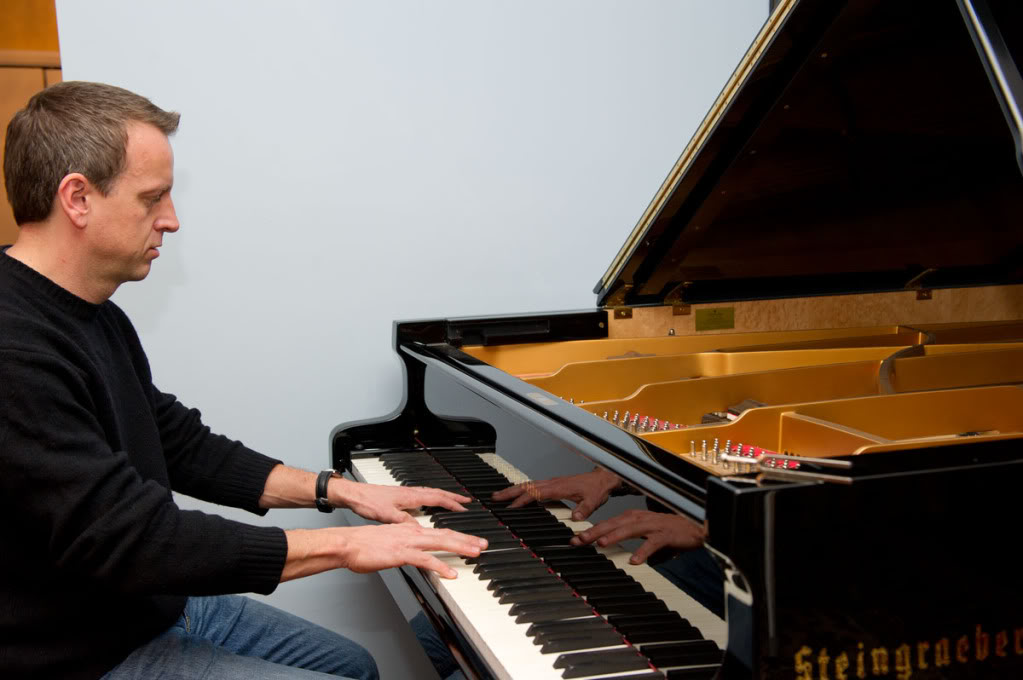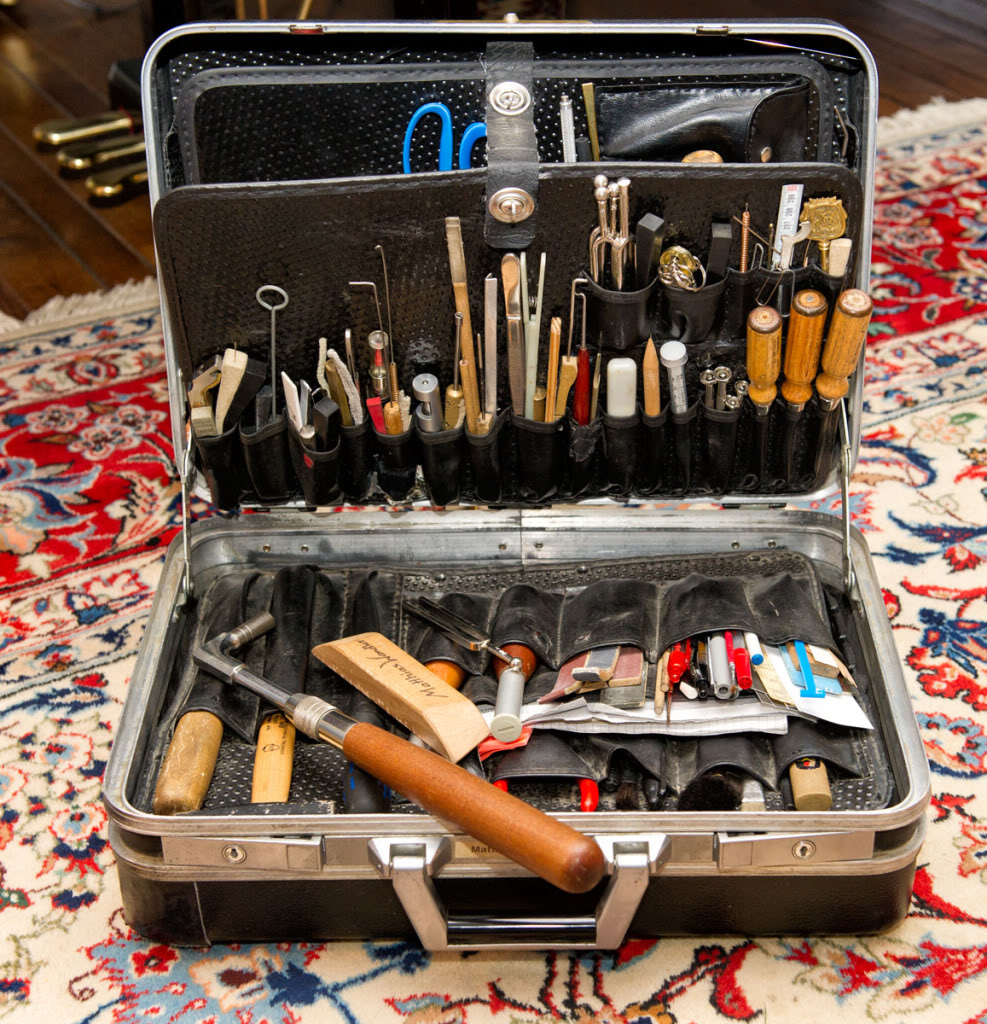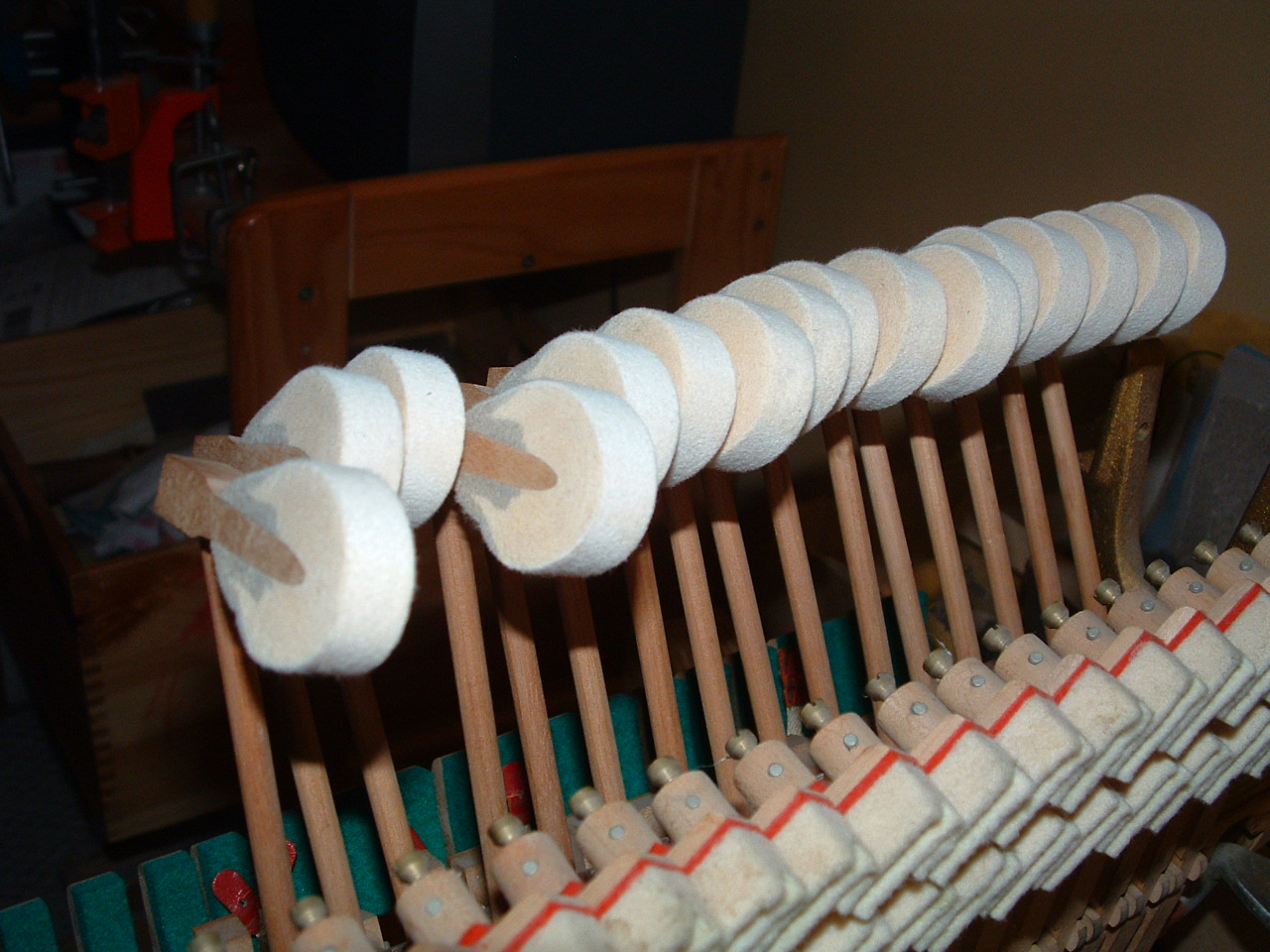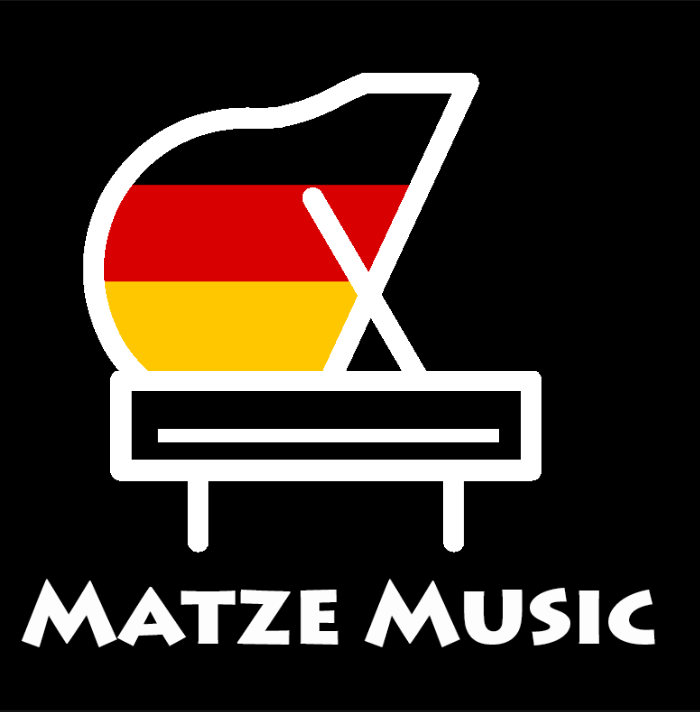If you have any additional questions, please feel free to contact Matthias via email or telephone at 703-975-7249.
PIANO MAINTENANCE FAQS
What does it mean to “tune” a piano?
Tuning is the process of adjusting the tension at which the strings are stretched, using a wrench called a tuning hammer, so that all the strings vibrate in pleasing harmony with one another in accordance with certain acoustical laws and aesthetic and musical customs. Although the tuner may also perform other adjustments to the piano at the same visit, strictly speaking, only the above process constitutes “tuning.”
Why does a piano go out of tune?
A piano in good condition goes out of tune primarily because its soundboard and other wooden parts expand and contract with changes in humidity, which changes the tension on the strings. This happens whether or not the piano is played. Also, a piano in poor condition, with the tuning pins loose in the pinblock, can go out of tune because it is unable to hold the string tension constant.
How often should I have my piano tuned?
How often your piano should be tuned depends on how sensitive you are to out-of-tuneness, how sensitive your piano is to the humidity changes that cause a piano to go out of tune, the climate you live in, how much you play, and your budget. For most people, one to three times per year is about right. Professional musicians and teachers may require more frequent service. Concert pianos are generally tuned (or the tuning touched up) before every performance.
At what time of the year should I have my piano tuned? Does it matter?
You will get the most for your money if you have the piano tuned at times of the year when the tuning will remain stable for some time. When the heat is turned on or off for the season, the indoor humidity, and consequently the tuning, begins to change, and these changes may continue for weeks or months afterward. For this reason, it’s best to wait for at least a few weeks after turning the heat on or off before having the piano tuned. Otherwise, the piano may go out of tune very shortly after being tuned. However, if you are sensitive to tuning, it may be difficult or impossible to time the tunings to the indoor humidity changes in such a way that you will be satisfied most of the time, especially in climates with cold winters. The tuning changes continuously, and the only ways to adapt to it are to have the piano tuned more frequently, to institute some kind of indoor or in-piano humidity control, or to put up with some amount of out-of-tuneness.
How much does it cost to maintain an acoustic piano?
It depends on how much you play and on how conscientious you want to be about piano maintenance. Typically a piano will be tuned twice a year at a cost of $100 to $200 per tuning, depending on geographic region and the experience and reputation of the tuner. Some tuners in high demand charge more. In addition, every so often a piano will need regulating (adjusting the piano action to compensate for wear and bring it back to the manufacturer's specs), voicing (adjusting the tone for changes that take place as a result of use), internal cleaning, and repairs. For most piano owners, budgeting an average of $300 to $500 per year will suffice, although the actual outlay will be less in some years and more in others. Teachers and performers who use the piano more, or need to maintain optimal performance, should budget accordingly.
Why do some pianos stay in tune longer than others?
Actually, all pianos go out of tune continuously. It just may take a while before you notice it. How soon you notice it depends on such factors as the design of the piano (though, interestingly, not necessarily on its quality), the various pressures and tensions being exerted on the soundboard and structural elements, climatic changes, your ear and sensitivity to out-of-tuneness, and on the kind of music you play.
If a piano technician says a piano is not tunable, does that mean the piano should be disposed of?
Not necessarily. It depends on why the piano is not tunable, how much it would cost to fix it, and how much the piano is worth. Sometimes the tuning pins can be tightened at minimal or moderate expense. In other cases, the piano needs to be restrung with larger tuning pins, or the pinblock needs to be replaced, possibly costing thousands of dollars. This would be worth doing only if justified by the potential value of the instrument.
What is A440?
This means that the A above middle C is vibrating at 440 cycles per second. This is the standard pitch to which most pianos and other instruments are tuned, also known as “concert pitch,” although some orchestras prefer to tune to a slightly higher pitch.
What is pitch correction (pitch raising/pitch lowering)?
When a piano is tuned, the tuner first tunes one note, usually the A above middle C, to a standard such as a tuning fork or electronic tone. Typically, the standard is A vibrating at a frequency of 440 cycles per second. Then the rest of the piano is tuned relative to that pitch. When, because of neglect or humidity changes, this A on the piano is far from its correct pitch, this pitch must be reestablished and the piano roughly tuned relative to that pitch. This is called pitch correction or, in any particular case, pitch raising or pitch lowering. After the pitch correction, a fine tuning can be done. If a fine tuning is attempted at the same time as a pitch correction, the piano will usually end up out of tune because the strings have a tendency to revert part way to their old tension when a large change in tension is attempted at one time. Due to the extra work involved, tuners will usually charge extra for a pitch correction, which may sometimes even require a second visit to complete. In some climates or with some instruments, a pitch correction may be required with nearly every tuning.
What is “aural tuning”?
Aural tuning is tuning the piano by ear (not using an electronic device).
Why do some tuners use an electronic device to tune the piano?
Electronic tuning devices have become extremely sophisticated in recent years and are used by some of the most skilled tuners. The best tuners can also tune by ear, which is necessary to check the work of the device and to do some aspects of the tuning job that are not easily done electronically. However, use of the electronic device can save the tuner time and fatigue, allowing him or her to do a better job and to do more jobs in a day than would be possible by ear. The devices are also very useful for tuning in difficult environments, such as when there is a lot of background noise, because they can screen out the noise better than the ear can. Some of the devices can also “save” a favorite or unusual tuning so that it can be exactly reproduced the next time it is needed.
Where is the best place in my home to put my piano?
The best place is where the temperature and humidity will remain relatively moderate and constant, and away from big drafts, open windows, and direct sunlight. Especially, keep the piano several feet away from heating registers and radiators, or block off or redirect the heat from such registers and radiators if the piano must be placed closer.
What is the best temperature and humidity for my piano?
Manufacturers like to say that the temperature should be at 72 degrees F. and the humidity about 45 percent. However, given climatic realities, human needs, and energy conservation issues, this may not always be possible or practical. In truth, pianos are not so delicate that they require such precision in their environment. Any temperature and humidity that are not extreme and are relatively constant will do. The more consistent the better.
Should I have a humidifier system installed in my piano?
Piano climate-control systems can help smooth out seasonal humidity changes, resulting in better piano sound and operation, longer life, and possibly less frequent tunings. Even if you already have whole-house humidification and de-humidification, you may benefit from the extra protection. Ask a piano technician or piano dealer about having a climate-control system installed in your piano.
Why does a piano need to be tuned after being moved?
Subtle differences in humidity between the new and old locations cause the piano to go out of tune. Very inexpensive pianos that are structurally inadequate may go out of tune because of the handling of the piano, but this is not a big factor for most instruments. The tuning of vertical pianos may be affected by unevenness in the level of the floor, or differences in the evenness between the old and new locations (grands are usually not affected by these issues).
When arranging to have my piano moved, shouldn’t I hire a piano mover that will also tune the piano at the same time?
First of all, very few piano movers also tune pianos. Both are skilled professions, but are quite unrelated to one another in the kind of skills they require. Most of all, however, the humidity difference that makes a piano go out of tune at the new location works its effect gradually over a period of from several days to several weeks. The piano may sound just fine right after being moved, but be quite out of tune a week or so later. If the piano is tuned immediately after being moved, it will probably be out of tune within a couple of weeks, so it’s best to wait some time after moving before having the piano tuned.
What is “regulating”?
Regulating is the adjusting of the action and keys to restore them to their factory-default specifications. See also the answer to the next question.
Can the touch or feel of my piano’s action be adjusted?
Within certain narrow parameters, the touch can be adjusted by regulating the action. Regulating is the process of restoring the dimensional relationships (positions, angles, distances, etc.) of the action parts to their factory-specified defaults. Over time and with playing, these dimensions gradually change and must periodically be restored in order for the piano to function properly. Each dimension also has a certain narrow window of permissible variation, so by cleverly manipulating these variations, it may be possible to make the touch slightly lighter or heavier, or the repetition faster, than the factory default specifications. Lubricating the many friction points in an action can also work wonders in lightening a heavy-feeling touch.
If changes are desired that fall beyond what is possible through normal regulating and lubrication, then the technician must carefully analyze the source of the problem and make more drastic changes to the action, which may involve modifying or rebuilding it to some extent. This was once solely the province of trial and error, but scientific principles can now be brought to bear on these problems, with consistent and happy outcomes. More advanced and technologically-savvy technicians can advise you about your options.
Note: There is a psychological connection between tone and touch. Sometimes adjusting the tone of the piano, or just tuning it, can make the piano’s touch feel better, even though there is no mechanical connection between tone (or tuning) and touch.
What is “voicing”?
Voicing is regulating the tone of the piano. The primary vehicle for this is the softening or hardening of the hammers. Softening the hammers is usually accomplished by pricking the hammer felt with needles to reduce its density. Hardening is usually done by chemically treating the hammers or ironing the felt. Other more sophisticated aspects of voicing involve the leveling of the strings, aligning the hammers with the strings, adjusting the end points of the vibrating portion of the strings, and adjusting the striking point of the hammers on the strings.
How can I lower the volume of my piano?
You can have the piano voiced, which mostly involves softening the hammers to produce a more mellow sound. You can also change the room acoustics by adding rugs, upholstered furniture, draperies, wall hangings, and other sound-absorbent objects. Storing some cardboard boxes under your grand piano, while not very attractive, can do wonders for softening the sound. Finally, there are some accessories on the market in the form of Styrofoam products, blankets, etc. that, when applied to the back or underside of the piano, can reduce the volume by many decibels. One home remedy is to wedge a quilt or blanket between the soundboard and the structural beams. Contact a piano technician for details.
Why do my piano’s keys sometimes stick?
Sticking keys are usually caused by humidity changes. Interestingly, keys can stick in both humid and dry weather. Humid weather can cause wood and cloth to swell and interfere with the movement of other parts. Dry weather can cause holes to contract and bind on guide pins. In most cases, the remedies are fairly simple, such as sanding or repositioning swollen parts, expanding tight holes, and lubricating.
My piano has a broken key. Is that a major repair?
When someone complains of a “broken key,” usually they mean that something is not working right. It could actually be a broken key, or it could be that something else in the action is broken or stuck. In any case, it’s usually not a major job to repair it. But neither is it necessarily trivial. If there are many such “broken keys,” it could be a sign of a major problem, commonly wood parts or glue joints that are hopelessly dried out and brittle.
My piano has a broken string. Is that a major repair?
A broken string is neither major nor trivial. If the string is a bass string (steel wound with copper), the replacement string will have to be special-ordered because each model of piano, and each bass string within that model, has unique specifications for length and thickness. If the broken string is plain steel wire, the technician should be able to replace it on the spot from a reel of wire of the proper diameter. There are about 15 or 20 possible wire diameters for steel piano wire, and technicians usually carry a small supply of each in their car. In either case, it will take several additional visits of the tuner over an extended period of time to stretch the new string before it will hold its tune. In the meantime, it may be necessary to mute the new string to prevent it from sounding sour. So, although the replacement of the string itself is not complicated, the whole process can end up being expensive and a nuisance.
What is the soundboard?
The soundboard is a large, thin sheet of wood (or a laminated wood product), usually of spruce, that amplifies the vibrations of the strings and broadcasts them through the air to the ear.
If the soundboard is cracked, does that mean the piano is junk?
No. Solid spruce soundboards have a tendency to dry out, shrink, and crack as they age, especially in environments that have pronounced seasonal variations in humidity. The shrinkage often results in a loss of crown, or curvature, of the soundboard, which can sometimes be detrimental to the tone. But the cracks themselves are usually harmless unless they are accompanied by buzzing sounds or other problems.
If the piano I am getting needs repair and I invest the money into the piano, shouldn’t I be able to recoup the money when I later sell the piano?
Unfortunately, not always. It depends on the nature and cost of the work, and on the value of the piano. The question to ask is whether the work to be done increases the value of the piano, and if so, by how much. Basic maintenance work like tuning and action regulation will not usually increase the value of the piano, whereas major work like restringing or replacing the soundboard will. (Of course, you should have the basic maintenance work done anyway or else the piano may be unpleasant to play and may deteriorate.) You should also consider the cost of a new piano of the same brand, or of a brand similar in quality, stature, or reputation. That’s because the value of a used piano will generally be tied to, and limited by, the cost of a comparable new one. You will usually recoup the cost of any good work you do on a piano like a Steinway or other top-rated brand because of their high value (both new and used), but for most other brands, your ability to recoup your expenses will be limited. That’s one reason why, except for sentimental or historical reasons, most older pianos are not completely restored.
